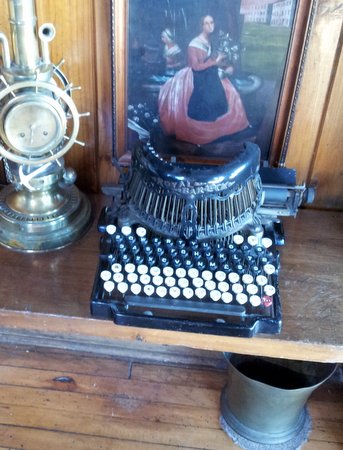The guard at La Sebastiana huddled with his cell phone in the corner of the room,
ignoring the sign that said Apague su teléfono celular, por favor, as I
happened upon Neruda’s Royal Barlock—beside an old Gimbal ship’s
clock which had stopped at 13:31 and an oil painting of a woman with flowers, resting
on a shelf above a tin bucket for champagne. And I, too, decided to ignore a sign,
the one that said La fotografía no permitido, and snapped a shot of the
machine that belonged to the greatest Latin American poet since Darío...

...the machine a black enameled marvel with a half circle of vertical pins, a double
keyboard, and an Art Nouveau font that had tapped out Veinte poemas de amor y una
canción desesperada—with the line,
“Llegó la poesía a buscarme,”
which changed Neruda’s life and the lives of his three wives and countless lovers and thousands of brothers and sisters who thought he sang only to them—and diplomatic memoranda to emperors, sheiks, and queens, and thankful notes to artists and sea captains, and a passionate accounting of the execution of his friend Federíco García Lorca, and 20 more volumes of poetry and a play and a memoir, and his speeches for the International Peace Prize, the Lenin Peace Prize, and the Stalin Peace Prize, and Discurso pronunciado con ocasión de la entrega del premio Nobel de literatura, and his resignation letter as Chile’s ambassador to France on the occasion of being diagnosed with cancer two years before his death, which came twelve days after Augusto José Ramón Pinochet Ugarte had tried to bury his freedom and ban his works, but Pablo Neruda—born Ricardo Eliecer Neftalí Reyes Basoalto in the town of Parral in southern Chile on July 12, 1904—was loved by too many and shared too much, and his voice could not be buried or banned or ignored, because he was the poet of the people and he wrote in their names and of their passions and of their blood.
Footnotes:
Apague su teléfono celular, por favor: (Turn off your cell phone,
please.)
La fotografía no permitido: (Photography not permitted)
Photo caption: Royal Barlock typewriter owned by Pablo Neruda, on display at La
Sebastiana House and Museum, Valparaíso, Chile (photo by Jack Cooper, 2014)
Veinte poemas de amor y una canción desesperada: (Twenty Love Poems
and a Song of Despair)
“Llegó la poesía a buscarme”: (“Poetry arrived in
search of me.”)
Discurso pronunciado con ocasión de la entrega del premio Nobel de
literatura: (Speech on the occasion of the Nobel Prize for Literature)
Bio:
Jack Cooper
